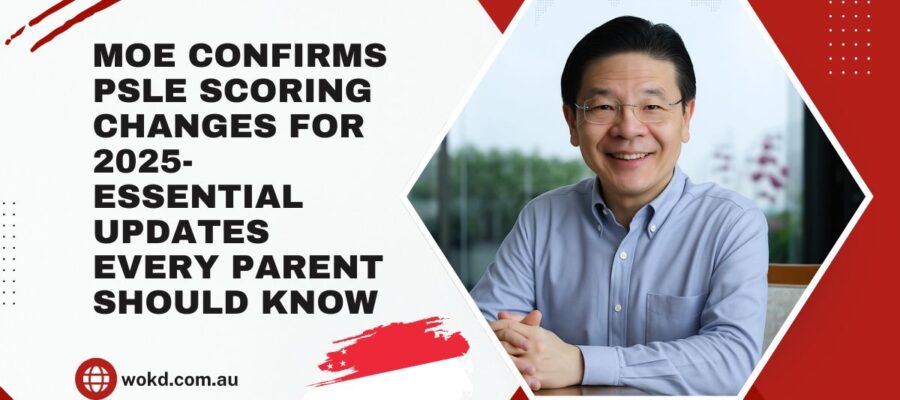Singapore’s Ministry of Education (MOE) has introduced a transformative change to the Primary School Leaving Examination (PSLE), effective from 2025.
This revamp marks a shift away from rigid academic competition and moves towards encouraging personal growth, subject mastery, and well-rounded development.
Instead of evaluating students in comparison with their peers, the updated system evaluates them against consistent academic standards.
At a Glance: Summary of 2025 PSLE Scoring Reform
| Aspect | Details |
|---|---|
| New Scoring Model | Based on Achievement Levels (ALs) |
| Overall Score Range | 4 (highest) to 32 (lowest) |
| Per-Subject Grading | 8 AL bands (AL1 to AL8) |
| Admission Criteria | AL score + school choice rankings |
| Previous System | T-score (peer-based comparison) |
| New Emphases | Subject-Based Banding, CCAs, holistic learning |
| MOE Official Website | www.moe.gov.sg |
Understanding the New PSLE Grading Format
The previous T-score system, long criticized for amplifying stress, graded students based on how they performed relative to their classmates.
In contrast, the Achievement Levels (ALs) model uses pre-set standards to assign grades, promoting learning and personal improvement over competition.
Old vs. New System Comparison
| Element | Previous System | New System (2025 Onward) |
|---|---|---|
| Scoring Method | Peer-relative (T-score) | Standard-referenced (ALs) |
| Total Score Range | 0 to 300+ | 4 (best) to 32 (lowest) |
| Grading Style | Ranked scores | 8 fixed bands per subject |
| Secondary Admission | Score-based priority | AL total + ranked school preferences |
Each subject—English, Mother Tongue, Mathematics, and Science—will receive an individual AL grade. The sum of these grades determines a student’s overall PSLE score.
Key PSLE Changes Parents Should Watch
1. Subject-Based Banding (SBB)
This initiative offers the flexibility to learn subjects at different levels based on a student’s strengths, acknowledging that children may excel in some areas while needing support in others.
2. Revised Admission System
School placements will consider both AL scores and the order of school choices, minimizing pressure on achieving top scores and encouraging more informed, balanced decision-making.
3. Emphasis on Holistic Growth
Beyond academic performance, MOE now recognizes co-curricular activities (CCAs), leadership roles, and community service as crucial to a student’s development, especially in secondary school applications.
Why the PSLE Reform Was Necessary
Feedback from parents, educators, and mental health professionals over the years emphasized the harm caused by academic pressure under the T-score model. Students were driven to compete against peers instead of focusing on personal learning goals.
The new Achievement Levels system aims to:
- Highlight individual progress rather than relative ranking
- Foster independent learning and self-awareness
- Ease performance anxiety and promote mental well-being
- Encourage essential life skills like adaptability, collaboration, and resilience
This direction aligns with Singapore’s broader “Learn for Life” education strategy.
How Parents Can Help Their Child Thrive Under the New System
1. Learn the AL Structure
Gain a clear understanding of how each AL band works per subject. This will help in setting realistic expectations and monitoring academic progress.
2. Explore School Options Broadly
Discuss with your child the values, strengths, and interests that matter to them. Choose secondary schools that align with these factors—not just prestige or past rankings.
3. Encourage Non-Academic Development
Support your child in joining projects, CCAs, and enrichment programs that build communication, problem-solving, and creativity.
4. Be a Mental Health Ally
Monitor stress levels and create an open environment for your child to talk about school challenges. Remind them that their worth isn’t defined by a grade.
What This Means for Singapore’s Education Future
The 2025 PSLE reforms represent more than an administrative update—they symbolize a paradigm shift in educational values. The focus now lies in nurturing consistent effort, deep learning, and balanced growth rather than just academic excellence.
Long-Term Benefits Might Include
- Less academic stress during foundational years
- Innovative and inclusive teaching methods
- A more diverse and adaptable student population
- Better preparation for a future driven by soft skills
The MOE’s 2025 PSLE scoring reform is a welcome evolution aimed at transforming how success is defined in Singapore’s schools.
By encouraging mastery over competition, and valuing holistic student development, the changes pave the way for a future where children are not only educated but also empowered for life.
FAQs
What are Achievement Levels (ALs) in the new PSLE system?
Achievement Levels replace the T-score system and consist of eight grade bands (AL1 to AL8) based on absolute academic performance, not relative scores.
Will it be harder to get into a top secondary school under the new system?
No. While admissions now consider AL scores and school choice rankings, the system is designed to reduce pressure and promote better student-school fit.
How does Subject-Based Banding benefit my child?
Subject-Based Banding allows students to learn at a pace suitable to their abilities, helping them excel in strengths while getting tailored support in other areas.

